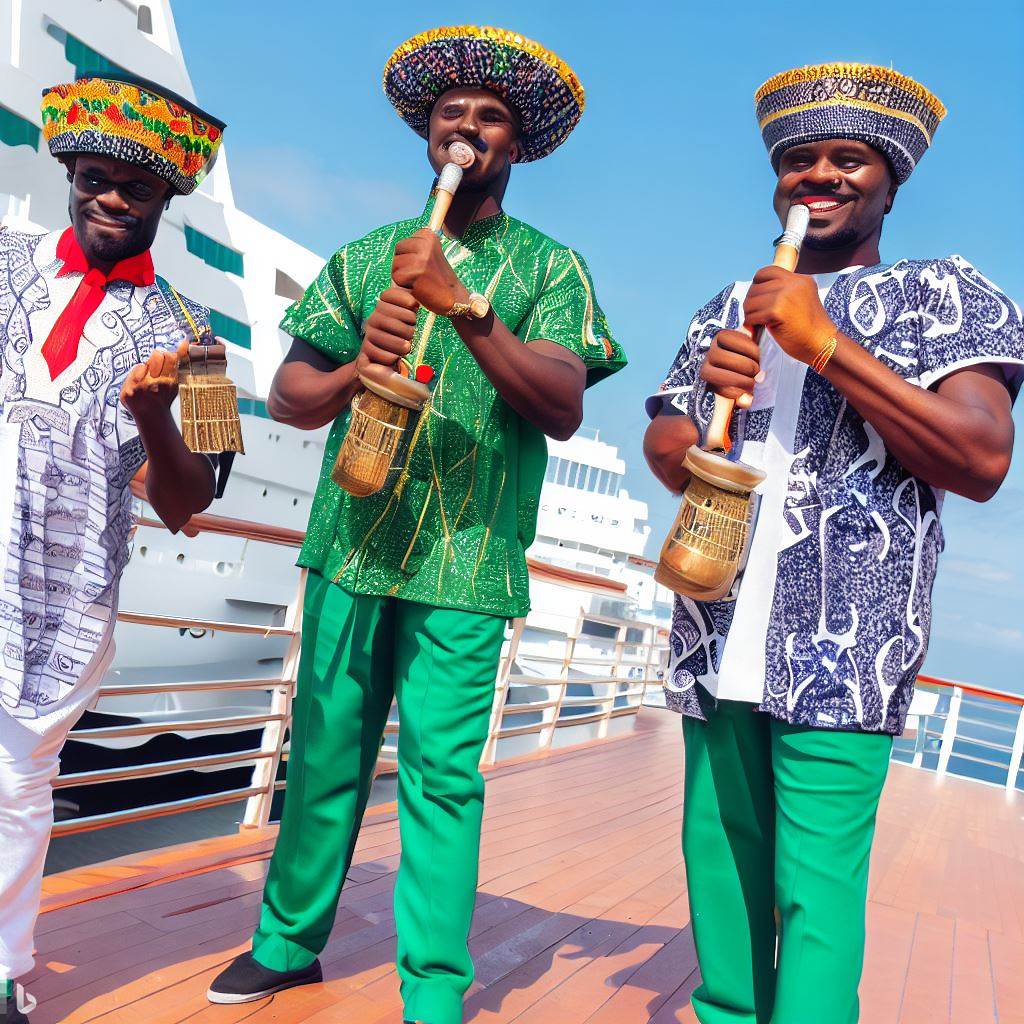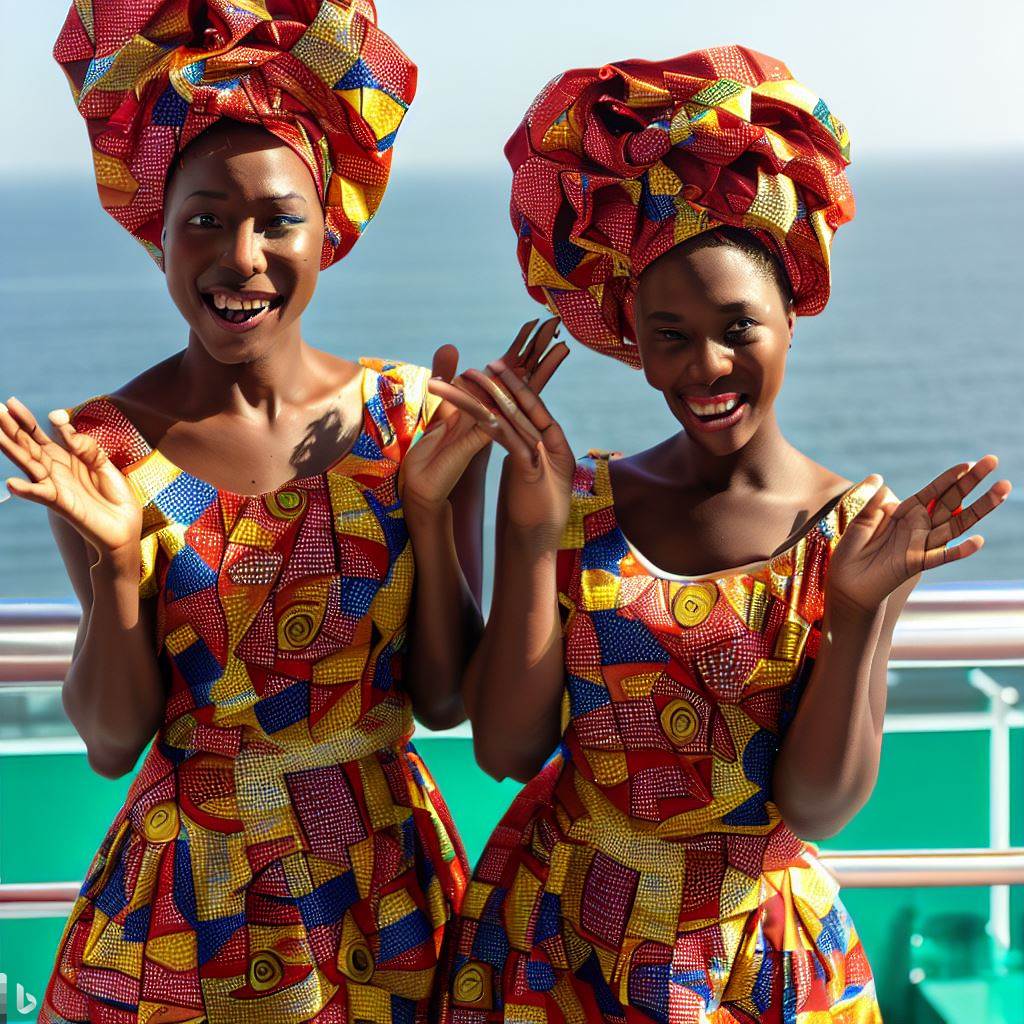Introduction
Purpose of the blog post
The purpose of this blog post is to explore the training schools for cruise ship entertainers in Nigeria.
Overview of the cruise ship entertainment industry in Nigeria
The cruise ship entertainment industry in Nigeria is thriving with numerous opportunities for performers.
Significance of training schools for cruise ship entertainers
The significance of training schools for cruise ship entertainers is to ensure skills and professionalism in this competitive industry.
Importance of Cruise Ship Entertainers Training Schools
Demand for skilled entertainers on cruise ships
- Cruise ships require talented entertainers to entertain guests throughout their journey.
- The demand for skilled entertainers in the cruise industry is constantly increasing.
- Passengers expect top-notch performances and unforgettable experiences during their cruise.
- Cruise companies are willing to invest in exceptional entertainers to enhance passenger satisfaction.
- Entertainment plays a crucial role in attracting and retaining customers for cruise lines.
Benefits of formal training schools for aspiring entertainers
- Formal training schools provide aspiring entertainers with a structured learning environment.
- Students learn essential technical skills, such as singing, dancing, acting, and instrument playing.
- Training schools focus on developing stage presence, charisma, and audience engagement techniques.
- Aspiring entertainers receive professional guidance and mentorship from experienced instructors.
- Training schools offer practical performance opportunities, preparing students for real-life scenarios.
How training schools can provide necessary skills and knowledge
- Training schools educate students on the cruise industry’s specific entertainment requirements.
- Students learn about the various entertainment roles available on cruise ships, from dancers to musicians.
- Training schools teach performers how to adapt their skills to different cruise ship environments.
- Students gain a deep understanding of the cruise ship entertainment industry’s standards and expectations.
- Training schools teach students to work collaboratively, as entertainers often perform in teams or ensembles.
In essence, Cruise Ship Entertainers Training Schools play a significant role in meeting the demand for skilled entertainers in the cruise industry.
These schools offer aspiring entertainers the opportunity to develop their talents and acquire the necessary skills and knowledge to succeed in the competitive cruise ship entertainment industry.
With formal training, entertainers can meet the high expectations of cruise ship passengers and contribute to enhancing the overall cruise experience.
Read: Nollywood and Its Impact on Voice Acting in Nigeria
Overview of Cruise Ship Entertainer Training Schools in Nigeria
Existence of Training Schools for Entertainers in Nigeria
- Nigeria has several training schools that specifically cater to the needs of cruise ship entertainers.
- These training schools focus on providing comprehensive programs for aspiring entertainers.
- They aim to prepare students for the unique challenges and demands of performing on cruise ships.
- The existence of these schools highlights the growing interest in the entertainment industry in Nigeria.
- Many talented individuals are now pursuing careers as cruise ship entertainers.
Curriculum and Courses Offered
- The curriculum offered by these training schools is designed to equip students with the necessary skills.
- Students will receive training in various performance disciplines, including singing, dancing, and acting.
- They will also learn about stage management, costume design, and other aspects of production.
- Courses in communication, teamwork, and customer service are also provided to enhance interpersonal skills.
- These schools ensure that students are well-rounded and versatile entertainers.
Facilities and Resources Provided
- Training schools for cruise ship entertainers in Nigeria offer state-of-the-art facilities.
- Students have access to fully equipped dance studios, music rooms, and rehearsal spaces.
- These schools also provide professional audio and lighting equipment for realistic performance experiences.
- Additionally, students can make use of costume departments and prop rooms to enhance their performances.
- Qualified and experienced instructors guide students throughout their training.
In short, training schools for cruise ship entertainers in Nigeria play an essential role in nurturing and producing talented individuals for the entertainment industry.
These schools provide a comprehensive curriculum that covers various performance disciplines and essential skills.
The facilities and resources offered by these schools are of high quality, ensuring that students receive the best training possible.
As the demand for cruise ship entertainers continues to grow, these training schools are contributing to the development of a vibrant entertainment industry in Nigeria.
Read: Cruise Lines in Nigeria: Opportunities for Entertainers
Admission Process and Requirements
Typical Admission Process for Training Schools
- Application: Interested individuals must first submit an application form to the training school.
- Documentation: Applicants need to provide necessary documents such as identification, educational certificates, and a resume.
- Audition: Candidates are typically required to audition to showcase their talents and skills.
- Interview: A panel of instructors or industry professionals may conduct interviews to assess the applicant’s suitability.
- Review and Selection: The training school evaluates each application based on talent, experience, and potential.
- Notification: Successful applicants receive a notification of acceptance, while others may be placed on a waiting list or declined.
General Requirements for Aspiring Entertainers
- Age Limit: Most training schools have a minimum age requirement, typically 18 years old and above.
- Education: While formal education is not always mandatory, aspiring entertainers should have at least a high school diploma or its equivalent.
- Skills and Talent: Demonstrating skills in performing arts like singing, dancing, acting, or playing an instrument is essential.
- Physical Fitness: Entertainers should maintain a good level of physical fitness as their work often involves stamina and endurance.
- Communication and Interpersonal Skills: Strong communication and interpersonal skills are crucial for interacting with guests or team members.
- Passion and Dedication: Aspiring entertainers should exhibit a genuine passion for their craft and a willingness to put in the hard work required.
Specific Criteria or Qualifications for Admission
- Specialized Training: Some training schools may require applicants to have prior training or experience in a specific area, such as vocal technique or dance.
- Language Proficiency: For cruise ship entertainers, a proficiency in English is often required due to the international nature of the job.
- Personality and Charisma: Schools may look for individuals who have a charismatic personality and can captivate an audience.
- Team Player: As entertainers often work within a team, the ability to collaborate and adapt to group dynamics is crucial.
- Professionalism: Schools seek individuals who demonstrate professionalism, punctuality, and a strong work ethic.
- Cultural Awareness: Given the diverse clientele on cruise ships, an understanding and respect for different cultures is highly valued.
In summary, aspiring entertainers interested in enrolling in training schools for cruise ship entertainment in Nigeria must go through a typical admission process.
This includes submitting an application, providing necessary documentation, auditioning, and participating in interviews.
General requirements such as age limit, education, skills, and physical fitness are essential.
Additionally, specific criteria such as specialized training, language proficiency, personality, and professionalism may influence admission decisions.
By meeting these requirements and qualifications, aspiring entertainers position themselves for a promising career in the vibrant industry of cruise ship entertainment.
Read: Insider Tips for Aspiring Cruise Ship Entertainers
Course Structure and Duration
Structure and Components of Courses Offered
- The courses offered at training schools for cruise ship entertainers in Nigeria have a comprehensive structure.
- The structure includes theoretical and practical classes to provide a well-rounded education.
- Theoretical classes focus on topics such as entertainment industry trends, marketing, and customer service.
- Practical classes involve hands-on training in various performing arts disciplines like singing, dancing, and acting.
- Students learn about stage presence, improvisation skills, and audience engagement techniques.
- Another important component of the courses is the development of language and communication skills.
- Students improve their proficiency in English, as it is the primary language used on cruise ships worldwide.
- Additionally, courses may encompass workshops and masterclasses conducted by industry professionals.
- These sessions offer valuable insights and guidance for aspiring cruise ship entertainers.
Duration of Training Programs
- The duration of training programs for cruise ship entertainers in Nigeria varies depending on the institution and course level.
- Basic courses typically range from six months to one year, providing a solid foundation for beginners.
- Advanced programs, designed for individuals with prior experience or education in performing arts, can extend up to two years.
- The longer duration allows for more in-depth training and specialization in specific entertainment genres.
- Students enrolled in longer programs often have opportunities for internships or practical experience on actual cruise ships.
- The duration of practical training on a cruise ship typically lasts for a specific period, usually between three to six months.
- During this time, students gain firsthand experience in a real cruise ship entertainment environment.
Additional Opportunities for Specialization or Advanced Training
- Some training schools offer specialized courses for students who wish to focus on a particular area of entertainment.
- These specialization courses can include vocal training, dance workshops, comedy, or magic classes.
- Advanced training options are available to individuals who have already completed a basic course and want to enhance their skills further.
- These programs delve deeper into advanced performance techniques and may include workshops with renowned industry professionals.
- Additionally, some schools provide opportunities for international collaborations and exchange programs.
- This allows students to gain exposure to different cultures, broaden their horizons, and expand their network.
- Specialization and advanced training can greatly benefit aspiring cruise ship entertainers, increasing their job prospects and marketability.
Generally, training schools for cruise ship entertainers in Nigeria provide comprehensive courses with both theoretical and practical components.
The duration of the training programs varies, offering options for beginners and those with prior experience.
Furthermore, additional opportunities for specialization and advanced training contribute to the overall development of aspiring entertainers.
These courses equip students with the necessary skills and knowledge to excel in the competitive cruise ship industry.
Read: Nigerian Cruise Ship Entertainers: Success Stories

Practical Training and Experiences
Importance of practical training in cruise ship settings
- Practical training plays a crucial role in preparing entertainers for the unique environment of cruise ships.
- It allows them to develop the necessary skills, adaptability, and resilience required for their roles.
- Immersing in real-life scenarios simulates the challenges and demands they will face on board.
- Practical training ensures entertainers are well-prepared to provide exceptional performances and guest experiences.
Various methods used by training schools to provide hands-on experience
- Training schools organize mock cruise ship environments to simulate real-life conditions.
- Students engage in practical exercises like live performances, rehearsals, and stage management.
- They receive guidance on operating audiovisual equipment, lighting systems, and other technical aspects.
- Interaction with industry professionals, including experienced cruise ship entertainers, is a common method.
- Internships and apprenticeships with established crews expose students to practical working environments.
Examples of practical training scenarios or collaborations with industry professionals
Practical training is invaluable as it bridges the gap between theoretical knowledge and real-world application.
In the context of cruise ship entertainment, it is even more crucial due to the unique challenges and requirements of performing at sea.
Students need hands-on experience to enhance their skills and understand the intricacies of working in a constantly changing environment.
Training schools recognize this need and employ various methods to provide practical training opportunities.
Creation of mock cruise ship environments
- Students participate in role-playing exercises to handle challenging guest interactions on cruise ships.
- One effective approach is the creation of mock cruise ship environments, where students can immerse themselves in simulated real-life conditions.
- This enables them to familiarize themselves with the ship’s layout, stage setup, and performance spaces.
Workshops led by experienced dancers, musicians, and performers enhance their practical skills.
- During practical exercises, students engage in live performances, rehearsals, and stage management duties.
- They are given the chance to practice their acts and receive feedback from instructors or industry professionals who act as guests.
- This hands-on experience allows them to fine-tune their performances and improve their stage presence.
Training schools collaborate with cruise lines to conduct specialized training programs.
- Technical aspects of cruise ship entertainment, such as operating audiovisual equipment and managing lighting systems, are also covered in practical training.
- Students gain proficiency in using state-of-the-art equipment commonly found on cruise ships.
- This knowledge is essential for them to execute their performances seamlessly and ensure a captivating visual experience for guests.
Guest lectures and masterclasses by renowned entertainers offer insights and knowledge-sharing.
- One of the most valuable components of practical training is the interaction with industry professionals.
- Training schools often invite experienced cruise ship entertainers to share their expertise and provide guidance to students.
- These professionals offer valuable insights into the challenges they have faced on board and share tips for success in the industry.
Joint projects with cruise ship staff allow students to collaborate and learn from seasoned professionals.
- Collaborations with industry professionals extend beyond internships. Training schools frequently organize workshops, guest lectures, and masterclasses conducted by renowned entertainers.
- These opportunities allow students to expand their knowledge and learn from experts who have achieved success in the industry.
- They can gain a deeper understanding of the artistry and professionalism required to thrive as cruise ship entertainers.
- Furthermore, joint projects between training schools and cruise ship staff provide students with the chance to collaborate and learn from seasoned professionals.
- Whether it be choreographing a dance routine or creating a musical composition, these collaborations facilitate the exchange of ideas and foster a nurturing learning environment.
Internships and apprenticeships are another significant aspect of practical training.
- Partnering with established crews, training schools arrange for students to spend time working on actual cruise ships.
- This exposes them to the real working environment and allows them to observe and learn from experienced entertainers in action.
- It also provides a platform for networking and building professional relationships.
In short, practical training plays a critical role in preparing cruise ship entertainers for their unique roles.
Through hands-on experiences and collaborations with industry professionals, students develop the skills, adaptability, and resilience necessary to excel in the dynamic cruise ship environment.
Read: How to Find Cruise Ship Entertainer Jobs in Nigeria
You Might Also Like: Top Skills Needed for Artists’ Agents in Nigeria
Job Placement and Opportunities
Potential Career Paths and Job Opportunities for Cruise Ship Entertainers
- Carnival Cruise Lines, Royal Caribbean International, and Norwegian Cruise Line are major employers.
- Cruise ship entertainers can pursue career paths as singers, dancers, actors, musicians, or variety performers.
- They can also work as cruise directors, activity coordinators, or production managers.
- Additional opportunities exist in children’s entertainment, art auctions, fitness instruction, and onboard retail.
Success Stories of Graduates from Training Schools
- Lucy Johnson, a graduate of the Nigerian Training School for Cruise Ship Entertainers, landed a singing contract with Royal Caribbean.
- Joshua Adams, another graduate, got hired as a dancer by Carnival Cruise Lines and travelled the world.
- The training schools have a track record of producing highly skilled performers who excel in their careers.
- Many graduates have received positive reviews and accolades from both passengers and cruise line management.
Support and Assistance Provided by Training Schools in Job Placement
- Training schools offer career counseling to help graduates identify suitable job opportunities.
- They provide networking opportunities through alumni programs and industry connections.
- Schools also maintain relationships with cruise line recruiters, increasing the chances of job placement.
- Job listings and audition notifications are regularly shared with graduates to aid in their job search.
- Mock auditions, resume building workshops, and interview preparation sessions are conducted to enhance job placement success.
- Graduates receive guidance on creating showreels and portfolios to showcase their talent to potential employers.
In a nutshell, the career paths and job opportunities for cruise ship entertainers are diverse, allowing individuals to pursue their passion in various roles.
Graduates from training schools in Nigeria have achieved remarkable success, securing contracts with renowned cruise lines.
The training schools offer valuable support and assistance in job placement through career counseling, networking, and maintaining relationships with cruise line recruiters.
The comprehensive preparation provided by the training schools equips graduates with the necessary skills to excel in their chosen careers.
Read: Cruise Ship Entertainer’s Earnings in Nigeria: A Deep Dive
Discover More: The History and Evolution of Music in Nigeria
Challenges and Future Outlook
Challenges Faced by Cruise Ship Entertainers in Nigeria
- Limited access to training schools and professional development opportunities.
- Lack of awareness and information about cruise ship entertainment careers.
- Difficulty in obtaining necessary visas and work permits for international opportunities.
- Inadequate infrastructure and resources for aspiring entertainers.
- Limited networking opportunities and industry connections.
- Challenges in adapting to the international standards and demands of cruise ship entertainment.
- Fierce competition from entertainers in other countries with more established training programs.
- Financial constraints and limited funding options for training and professional development.
- Language barriers when dealing with international passengers and crew members.
Potential Growth and Improvements in the Industry
- Increasing globalization and demand for cruise ship entertainment create growth opportunities.
- Potential for partnerships between Nigerian training schools and international cruise ship companies.
- Advancements in technology and online platforms for training and promotion.
- Improving infrastructure and resources for entertainment venues in Nigeria.
- Collaboration with government agencies to promote and support the industry.
- Expansion of cruise ship routes and itineraries that include Nigerian ports.
- Increased recognition and appreciation for Nigerian talent in the international entertainment industry.
- Development of mentorship programs to guide aspiring cruise ship entertainers.
- Efforts to diversify the types of entertainment offered on cruise ships, showcasing Nigerian culture.
Current Initiatives to Enhance Training Programs and Opportunities
- Establishment of specialized training schools and institutions focusing on cruise ship entertainment.
- Collaboration between industry professionals and training institutions to develop comprehensive curriculum.
- Scholarship programs and financial aid options for aspiring entertainers who lack resources.
- Networking events, workshops, and seminars to connect aspiring entertainers with industry veterans.
- Partnerships with international cruise ship companies to provide internship and job placement opportunities.
- Development of online platforms for training, audition submissions, and talent promotion.
- Government support and incentives to attract international cruise ship companies to Nigerian ports.
- Creation of industry associations and organizations to advocate for the rights and interests of cruise ship entertainers.
- Promotion of Nigerian entertainment talent through cultural events, festivals, and showcases.
Overall, while there are numerous challenges faced by cruise ship entertainers in Nigeria, the industry holds great potential for growth and improvement.
With the identification of these challenges, efforts can be made to overcome them and create a more vibrant and inclusive entertainment industry.
Initiatives are being implemented to enhance training programs, improve opportunities, and promote Nigerian talent on the international stage.
Through collaboration, government support, and dedication from industry professionals, the future outlook for cruise ship entertainers in Nigeria looks promising.
Read: Role and Responsibilities of a Nigerian Music Director
Conclusion
Summarize the importance of training schools for cruise ship entertainers in Nigeria
Achieving success as a cruise ship entertainer in Nigeria requires proper training and education.
Training schools for cruise ship entertainers play a crucial role in providing aspiring artists with the skills and knowledge they need to excel in this industry.
Reiterate the benefits and opportunities provided by these institutions
These institutions offer a multitude of benefits and opportunities to their students. They provide rigorous training in various performing arts disciplines, including singing, dancing, acting, and stage presence.
Students also gain valuable insights into the business side of entertainment, such as contract negotiations and marketing themselves as artists.
Encourage aspiring entertainers to consider enrolling in training schools for professional growth and success
- Enrolling in a training school for cruise ship entertainers can significantly enhance an aspiring entertainer’s professional growth and success.
- These institutions not only equip students with the necessary technical skills but also cultivate their artistic abilities and stage presence.
- Furthermore, these training schools provide valuable networking opportunities, allowing students to connect with industry professionals, cruise line representatives, and other successful entertainers.
- This networking can open doors to potential job offers and collaborations in the cruise ship industry.
- Lastly training schools for cruise ship entertainers in Nigeria are of utmost importance for individuals aspiring to succeed in this competitive field.
- These institutions offer a comprehensive education, invaluable connections, and a platform for professional growth.
- Aspiring entertainers are strongly encouraged to consider enrolling in these training schools to acquire the necessary skills and knowledge for a successful career as a cruise ship entertainer.




